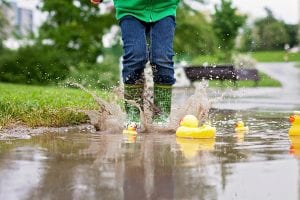Using everyday play to help your children develop their skills by Karen Brunyee, STEM Learning.
Young children are naturally curious and want to explore their surroundings – this is the perfect starting point for developing their STEM skills. As a parent, you can play an essential role in supporting your children to develop these abilities.
Through everyday play, you can encourage your child to talk about what they see and experience. This will help them to engage more with their learning and allow them to appreciate more fully everything that is around them.
What role can you play?
Children can be very observant and when they do notice things, it gives you the opportunity to discuss what they have observed:
- Can they notice the details in the objects they are looking at and describe them in detail?
- What is different?
- What is the same?
- How are they moving?
 After exploring something, children might be able to hypothesize about how it might respond in the future. For example:
After exploring something, children might be able to hypothesize about how it might respond in the future. For example:
- What do they see when dropping a stone in a puddle?
- What do they predict will happen if we drop a larger stone?
They can then have a go and test their predictions. By doing this, they are performing simple experiments and having fun at the same time.
Can they describe what it is they are seeing and can they explain this to you? If needed, demonstrate the correct vocabulary and the children will pick this up and use it to help with their explanations.
Learning through everyday tasks
Children will often count as a rhyme up to ten and back, but do they understand that each number stands for one thing/object? Ask your children to count the plates at dinner time or fetch three oranges at the supermarket.
Can they share the sweets out equally? Or build a tower that is ten blocks high? All of these activities help to consolidate the one to one correspondence needed for early mathematical understanding.
Find something that interests them
The key to developing any skill is to follow the interests of the child and then find the learning in any situation. Playing with a magnetic fishing game can lead to an exploration of magnetic effect, what does it ‘stick’ to? What can we pull along with our magnets?
- When building sand castles at the beach, ask your child to build the tallest castle:
- Is it better to have wet or dry sand?
- How many shells can you decorate your castle with?
- How deep does the moat need to be to get water from the sea without having to bring a bucket from the water?
 Playing with cars allows children to explore how wheels roll and which car can travel the furthest down a ramp. Count the number of cars and park them in the correctly numbered carpark space.
Playing with cars allows children to explore how wheels roll and which car can travel the furthest down a ramp. Count the number of cars and park them in the correctly numbered carpark space.
There are so many opportunities to support your children develop these crucial life skills, whilst still having fun! If you are looking for inspiration, our primary science resource packages are a useful starting point www.stem.org.uk/primary-science







